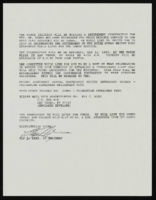Search the Special Collections and Archives Portal
Search Results

June Monroe and Kazuko Atomura oral history interview: transcripts
Date
Archival Collection
Description
Oral history interviews with June Monroe and Kazuko Atomura conducted by Cecilia Winchell and Stefani Evans on July 14 and July 19, 2022 for Reflections: the Las Vegas Asian American and Pacific Islander Oral History Project. In the first interview, Kazuko Atomura describes her childhood in Taiwan and Tokyo, Japan, and shares both happy and difficult mememories of that time. Atomura eventually moved to Los Angeles, California, where she reconnected with a man she previously met in Japan. She married him and together had their daughter, June Monroe, and another son while living in Corpus Christi, Texas. After difficult medical procedures involving Atomura's husband and Monroe's younger brother, Brian, the family relocated to Las Vegas, Nevada. Monroe recalls attending Las Vegas High School and Bonanza High School, and the struggle of making new friends as a young person. In the second interview, the mother and daughter discuss racism, discrimination, and identity. Kazuko Atomura recalls her many experiences with discrimination as a result of both her appearance and language barriers. June Monroe discusses how she came to be proud of her Japanese heritage, while Atomura discusses some of the community activities she has been involved in since living in Las Vegas including the Japanese Culture Club and odori dancing. Then, both Atomura and Monroe discuss Monroe's brother, Brian, who received two kidney transplants; one from Monroe's father and one from Monroe herself. Atomura talks about the shrines she has built for Brian, the experience of him being on dialysis, care taking, and his final days. Monroe shares about her activism with organ donation, being regularly involved with the Nevada Donor Network and helping to pass significant pieces of legislation within the area of organ donation.
Text
Emily Persaud-Zamora oral history interview
Identifier
Abstract
Oral history interview with Emily Persaud-Zamora conducted by Cecilia Winchell and Stefani Evans on January 17, 2023 for the Reflections: the Las Vegas Asian American and Pacific Islander Oral History Project. In this interview, Persaud-Zamora remembers growing up in Queens, New York and being exposed to numerous cultures and ethnicities. Though her parents separated when she was two, Persaud-Zamora maintained a steady relationship with both. Her mother was originally from Brazil and worked as a chef, primarily for private homes. Her father was an immigrant from Guyana, with roots in India, and did catering for large events and eventually moved to Georgia. Growing up she recalls being between two worlds, never feeling quite Brazilian enough or Asian enough, but still being connected to her Hindu roots in various ways. When she was fifteen, Persaud-Zamora and her mother moved to Las Vegas, Nevada, where she continued high school and describes the cultural differences between the two places she had lived. After high school, she received a degree in political science and ended up working in public policy. Her current position at Silver State Voices involves work with many different organizations across Nevada to advocate for progressive issues and underrepresented communities. Throughout the interview, Persaud-Zamora touches on a number of other issues, including her religion, traditions, and family.
Archival Collection
Beula Jane Adams oral history interview
Identifier
Abstract
Oral history interview with educator Beula Jane Adams (b. 1902) conducted by Maureen Conner on May 11, 1977 for the Ralph Roske Oral History Project on Early Las Vegas. Born in Smithfield, Nebraska, Adams relocated to Las Vegas, Nevada in 1932. During the interview Adams explores and highlights the role of education in relation to the social development of Nevada. Adams discusses presidential visits, early above ground atomic tests, and her involvement in local politics.
Archival Collection

Mabel Hoggard: religious materials
Date
Archival Collection
Description
Folder of materials from the Mabel Hoggard Papers (MS-00565) -- Personal papers file. This file contains religious booklets, programs, newspaper clippings, and other documents. Represented in the materials are records from: Griffith United Methodist Church, Church Women United of Greater Las Vegas, Zion Methodist Church, Clark County Protestant Ministerial Association, and Desert Southwest Conference of the United Methodist Church.
Mixed Content

Arsya Respati oral history interview: transcript
Date
Archival Collection
Description
Oral history interview with Arsya Respati conducted by Madison Chang on December 4, 2021 for Reflections: The Las Vegas Asian American and Pacific Islander Oral History Project. University of Nevada, Las Vegas (UNLV) student Arsya Respati shares his childhood and upbringing in Jakarta, Indonesia and educational background. He discusses his studies at the international BINUS SCHOOL Simprug in Jakarta and his immigration to the United States with his younger brother to pursue the culinary arts at the William F. Harrah College of Hospitality at UNLV. Arsya Respati talks about his relationship with his parents and their daily communication, his "aunty" who has helped him adjust to American culture and homesickness, his Muslim faith and traditions, and his employment. He also shares his views on Indonesian politics and cultural diversity, and the diversity of Las Vegas.
Text
Audio clip from interview with Phyllis Friedman, March 2, 2015
Date
Archival Collection
Description
Phyllis Friedman discusses the local productions of "The Laramie Project" play performed at area high schools. She talks about the different reactions from the community to the production, and the involvement of the Anti-Defamation League (ADL).
Sound

Transcript of interview with Hal G. Curtis by Bill Teepe, February 24, 1977
Date
Archival Collection
Description
On February 24, 1977, Bill Teepe interviewed Hal G. Curtis (born 1926 in Galt City, California) about his life in Southern Nevada. Curtis talks first about his work on the Union Pacific Railroad before discussing changes and development in Las Vegas, including development on the Strip and Downtown areas. He also talks about Block 16, the El Rancho Vegas fire, social clubs, and religion.
Text

Transcript of interview with Milton I. Schwartz by Claytee White, May 4, 2004
Date
Archival Collection
Description
In this interview, Milton Schwartz discusses his life in Las Vegas and his business investments. He worked at the Flamingo Hotel right after World War II, and he started Valley Hospital as an investor in 1970. Schwartz has a Hebrew academy named after him in Israel, and owned the Yellow-Checker-Star Cab Company. He was active in the Republican Party.
Milton I. Schwartz was born and raised in Brooklyn, New York. He enlisted in the Army the day after Pearl Harbor (age 20) and did a five year stint in the Pacific as a repeater specialist. After the war he returned to his job as a refrigeration mechanic in Brooklyn and was soon offered a job out in Las Vegas at the Flamingo Hotel, which was owned by Bugsy Siegel. After three months in Las Vegas, during which time he had several conversations over dinner with Beldon Cattleman, Milton returned to New York to work with his father in the fixture business. After ten years he sold that business and bought into Design Equipment Construction, which brought him back to Las Vegas. Milton started or bought many businesses over the years, but the one he's proudest of is Valley Hospital. He and his partners brought the first medical helicopters into Nevada and he feels that many lives were saved because of that. He also invested in Yellow-Checker-Star Cab Company, which he still owns. Two on-going concerns that are important to Milton are his involvement with the Republican Party and the Milton I. Schwartz Hebrew Academy in Israel. Of the many awards and plaques he has earned over the decades, he is proudest of the birthday acknowledgements from the Academy. He believes strongly that the most important achievements of his life revolve around his religion and the children being educated in it. Milton shares many stories, facts, descriptions, and anecdotes about Las Vegas in the decades since 1946. He built a house in the Scotch 80's, contributes to UNLV, and approves of city growth and the proposed changes in the downtown area. He has contributed much to the growth and stability of the Las Vegas valley.
Text


